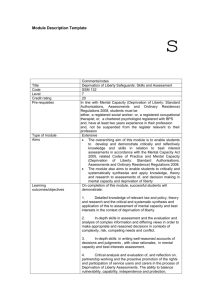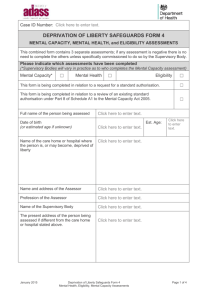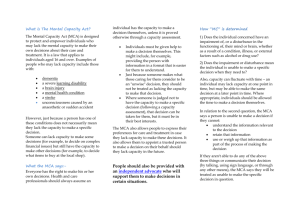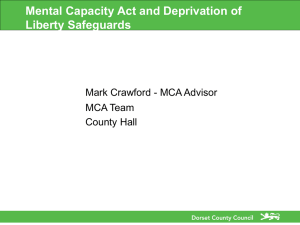module aims, assessment and support
advertisement
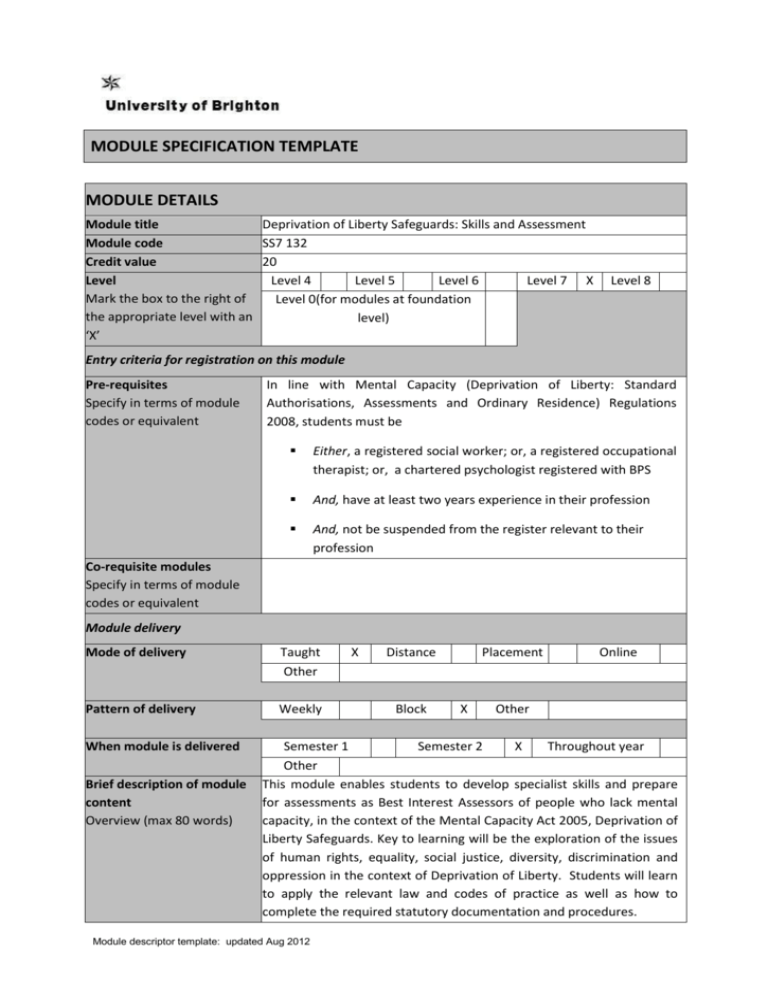
MODULE SPECIFICATION TEMPLATE MODULE DETAILS Module title Deprivation of Liberty Safeguards: Skills and Assessment Module code SS7 132 Credit value 20 Level Level 4 Level 5 Level 6 Level 7 X Mark the box to the right of Level 0(for modules at foundation the appropriate level with an level) ‘X’ Level 8 Entry criteria for registration on this module Pre-requisites Specify in terms of module codes or equivalent In line with Mental Capacity (Deprivation of Liberty: Standard Authorisations, Assessments and Ordinary Residence) Regulations 2008, students must be Either, a registered social worker; or, a registered occupational therapist; or, a chartered psychologist registered with BPS And, have at least two years experience in their profession And, not be suspended from the register relevant to their profession Co-requisite modules Specify in terms of module codes or equivalent Module delivery Mode of delivery Taught Other Pattern of delivery Weekly When module is delivered Brief description of module content Overview (max 80 words) X Distance Block Placement X Online Other Semester 1 Semester 2 X Throughout year Other This module enables students to develop specialist skills and prepare for assessments as Best Interest Assessors of people who lack mental capacity, in the context of the Mental Capacity Act 2005, Deprivation of Liberty Safeguards. Key to learning will be the exploration of the issues of human rights, equality, social justice, diversity, discrimination and oppression in the context of Deprivation of Liberty. Students will learn to apply the relevant law and codes of practice as well as how to complete the required statutory documentation and procedures. Module descriptor template: updated Aug 2012 Module team/ author/ coordinator(s) School Site/ campus where delivered Jackie Lelkes, Jem Price, Martine Danby, Julia Stroud, David Watson School of Applied Social Science Falmer Course(s) for which module is appropriate and status on that course Course MSc Advanced Social Work/ and Management PGDip Professional Social Work Practice Status (mandatory/ compulsory/ optional) M/O M/O MODULE AIMS, ASSESSMENT AND SUPPORT Aims Learning outcomes (N.B Learning outcomes are linked to The College of Social Work Best Interest Assessor Capabilities 2013) The aims of the module are as follows: : The overarching aim of this module is to enable students to develop and demonstrate critically and reflectively knowledge and skills in relation to best interest assessments in accordance with the Mental Capacity Act 2005, related Codes of Practice and Mental Capacity (Deprivation of Liberty: Standard Authorisations, Assessments and Ordinary Residence) Regulations 2008. The module aims also to enable students to critically and systematically synthesise and apply knowledge, theory and research to assessments of, and decision making in mental capacity and deprivation of liberty On successful completion of the module the student will be able to demonstrate: 1. In depth, thorough knowledge of relevant law and policy, theory and research and the critical and systematic synthesis and application of this to assessment of mental capacity and best interests in the context of deprivation of liberty. Key Capability 1: the ability to apply in practice and maintain knowledge of relevant legal and policy frameworks 2. In-depth skills in assessment and the evaluation and analysis of complex information and differing views in order to make proportionate and reasoned best interest decisions in contexts of complexity, risk, competing needs and conflict. Key Capability 4: the ability to balance a person’s right to autonomy and self-determination with their right to safety and respond proportionately; Key Capability 5: The ability to make informed, independent best interest decisions within the context of a DOL(S) assessment; Key Capability 6: The ability to effectively assess risk in complex situations and use analysis to make proportionate decisions ) 3. Self-directed and sophisticated skills in writing well-reasoned accounts of decisions and judgments, with clear rationales in Module descriptor template: updated Aug 2012 mental capacity and best interests assessment. Key Capability 5 The ability to make informed, independent best interest decisions within the context of a DOL(S) assessment 4. Critical analysis and evaluation of, and reflection on, partnership working and the proactive promotion of the human rights and inclusion of service users and carers in the process of Deprivation of Liberty Assessments. The ability to balance vulnerability, capability, independence and protection, together with clear articulation of the role of Best Interest Assessor and systematic and critical evaluation of, and reflection on, own role. Key Capability 2: The ability to work in a manner congruent with the presumption of capacity; Key Capability 3: The ability to take all practical steps to help someone to make a decision) 5. Critical understanding, analysis and evaluation of the importance of collaborative practice with service users’ representatives and within the multi-disciplinary and interprofessional networks involved with Best Interest Assessments. Key Capability 5 The ability to make informed, independent best interest decisions within the context of a DOL(S) assessment 6. Comprehensive understanding of proportionality in decision making; issues of power, equality and discrimination, respecting the unique qualities, strengths and rights of users of services and carers. Key Capability 5 The ability to make informed, independent best interest decisions within the context of a DOL(S) assessment Content Knowledge of the 2005 Mental Capacity Act, related Codes of Practice and Regulations, Lasting Powers of Attorney, legal position of DOL(S) and BIAs, etc. . Knowledge of other relevant legislation and policy, including the Mental Health Act 1983, as amended by the Mental Health Act 2007; the Human Rights Act 1998; Health and Social Care Bill 2012; related Community Care legislation and related standards and frameworks, including safeguarding and protection policies . The synthesis and application of law, policy, research and theory to complex situations involving the assessment of mental capacity and best interests with regard to deprivation of liberty. The social impact of the disability or illness and the experience of users and carers; possible interventions/ treatment; issues of discrimination, empowerment and inclusive practice with service Module descriptor template: updated Aug 2012 users and carers as associated with the operation of the Deprivation Of Liberty Safeguards Learning support Skills in assessment, appraisal, evaluation and reflection, including the importance of gathering and applying information to decision making and the analysis and the assessment and safe management of risk in complex situations. Communication skills for working with people who may be lacking capacity in order to proactively promote the views, rights and participation of service users and carers. Collaborative practice within multi-disciplinary and interprofessional networks. Working in partnership with the person’s representatives and other professionals involved in the D.O.L.S. procedures, including I.M.C.A.s, Mental Health Assessors, Mental Capacity Assessors, people with a Lasting Power of Attorney and a person’s representative. Knowledge and understanding of relevant documentation and written skills for keeping appropriate records and producing clear and reasoned reports. Students will be supported in their learning by module teaching staff who will be available in person during the intensive teaching phase and via email and prearranged tutorials after it during the preparation for the Open Book examination. Indicative Reading Brown, K (Ed.) 2010 Vulnerable Adults and Community Care. 2nd Ed. Exeter: Learning Matters Brown, R. and P. Barber 2008.The Social Worker’s Guide to the Mental Capacity Act 2005. Exeter: Learning Matters Care Quality Commission 2012. The Operation of the Deprivation of Liberty Safeguards in England 2010/11 Department of Health 2009.Report on the Consultation on the Review of “No secrets: Guidance on developing and implementing multiagency policies and procedures to protect vulnerable adults from abuse” London: Dept. of Health Dwyer, S. 2010 The Deprivation of Liberty Safeguards and People with Dementia: Implications for Social Workers. British Journal of Social Work (2010) 40 (5): 1503-1516. Hewitt, D. 2009. Not just in the Mental Capacity Act: using the law to protect vulnerable adults. The Journal of Adult Protection 11(2): 25 31 Module descriptor template: updated Aug 2012 Jones, K., B. Cooper and H. Ferguson (Eds) 2008. Best Practice in Social Work – Critical Perspectives. Basingstoke: Palgrave Jones, R. 2010 Mental Capacity Act Manual 4th.d. edition. London: Sweet & Maxwell Jones, R. 2011. Mental Health Act Manual 14th.Edition. London: Sweet and Maxwell McDonald, A. 2010 The Impact of the 2005 Menta lCapacity Act on Social Workers' Decision Making and Approaches to the Assessment of Risk. British Journal of Social Work (2010) 40 1229-1246 Manthorpe, J. & S. Martineau. 2011. Serious Case Reviews in Adult Safeguarding in England: An Analysis of a Sample of Reports BJSW 41(2): 224 – 241 Mental Capacity Act 2005 Code of Practice. Dept. for Constitutional Affairs 2007: Stationery Office Mental Capacity Act 2005: Deprivation of liberty safeguards - Code of Practice to supplement the main Mental Capacity Act 2005 Code of Practice. London: Ministry of Justice 2008 Redley, M. Clare, I. Dunn,M. et al 2011. Introducing the Mental Capacity Advocate (IMCA) Service and the Reform of Adult Safeguarding Procedures. British Journal of Social Work, January 2011 41 (1) Teaching and learning activities Details of teaching and learning activities Teaching and learning on this module focuses upon the development of knowledge in relation to use of the Mental Capacity Act 2005 and the critical application of knowledge, theory and research to assessments under the Deprivation of Liberty Safeguards. Learning an detaching methods include formal lectures and other presentations; simulated case material; small group discussions. Presenters include, practitioners, lawyers, service users and carers and other professionals (e.g. IMCAs). In learning and teaching there is focus also upon the development of skills in the use and application of the Mental Capacity Act 2005, related Codes of Practice and Regulations to assessments for Deprivation of Liberty. Allocation of study hours (indicative) Where 10 credits = 100 learning hours Study hours SCHEDULED 35 Contact hours Module descriptor template: updated Aug 2012 GUIDED INDEPENDENT STUDY Directed study, Private study, Assessment preparation 165 PLACEMENT TOTAL STUDY HOURS 200 Please note this must amount to 200 hours for a 20 credit module Assessment tasks Details of assessment for this module All learning outcomes will be demonstrated via a 2 part open book examination: A 1.5 hour examination, to test knowledge and understanding of relevant law, codes or practice, practice guidance in Deprivation of Liberty Safeguards assessments. A 2.00 hour examination relating to a seen case study, to enable the student to demonstrate evidence of critical appraisal and analysis of information and decision-making. This part of the examination will include the completion of appropriate relevant documentation. The marks from the two parts of the examination will be aggregated in order to achieve an overall mark/ grade for credit. Both parts of the examination must be passed in order to achieve academic credit. The practice documentation will be graded pass/fail but must be graded as pass in order to pass the module. Types of assessment task1 Indicative list of summative assessment tasks which lead to the award of credit or which are required for progression. % weighting (or indicate if component is pass/fail) WRITTEN COURSEWORK 2 part open-book examination - 100% Including satisfactory completion of associated Pass/Fail 1Set exercises,which assess the application of knowledge or analytical, problem-solving or evaluative skills, are included under the type of assessment most appropriate to the particular task. Module descriptor template: updated Aug 2012 practice documentation PRACTICAL EXAMINATION INFORMATION Area examination board SASS AMHP and CPD SW Examination Board: Combined Area and Course Examination Board Refer to Faculty Office for guidance in completing the following sections External examiners Name Position and institution Date appointed Date tenure ends Alan Butler Research Fellow, University of Leeds 01/09/2007 31/10/2013 QUALITY ASSURANCE Date of first approval Only complete where this is not the first version September 2008 Date of last revision Only complete where this is not the first version April 2013 Date of approval for this version April 2013 Version number 2 Modules replaced Specify codes of modules for which this is a replacement Old code SSM132 Available as free-standing module? Module descriptor template: updated Aug 2012 Yes X No
